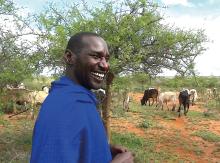Land Library Search
Through our robust search engine, you can search for any item of the over 73,000 highly curated resources in the Land Library.
If you would like to find an overview of what is possible, feel free to peruse the Search Guide.
/ library resources
Showing items 1 through 9 of 25.Este trabajo da cuenta de la visión de desarrollo y su incidencia en la implementación del acuerdo uno (1) de la Habana sobre Desarrollo Rural Integral, desde el enfoque de paz territorial y los mecanismos construidos para la consecución de la paz en sus territorios por las comunidades negras en
Following the end of apartheid, South Africa’s government set itself ambitious goals with a planned land reform. However, there have since been barely any changes in the country’s agricultural structure, and the positive impacts that were hoped for on rural livelihoods have hardly materialised.
The year 2016 marks 15 years since the new wave land reforms became operational in Tanzania. Despite its ambitious goals – encouraging land registration and titling, and empowering women and other vulnerable groups – the results are disillusioning.
The land reform process in Cambodia is full of examples of injustice and human rights violations. Promises to improve the situation of the landless and land-poor citizens have remained unfulfilled. Development co-operation efforts have not changed this either.
In 1978, the rural reform began in China, and since then farmers, including the poor ones, have benefited from a steady growth in income and gradually strengthened food security.
Zimbabwe used to be well-known for its high-quality meat exports. The sector was hard hit by the economic crisis that set in during the 1990s and coincided with the impact of a failed land reform and recurrent drought.
El objetivo del trabajo es examinar la revisión oficial de las “donaciones condicionadas” implementadas en el partido de Azul y la respuesta de la sociedad rural durante la segunda mitad del siglo XIX.
A partir de un estudio de caso de la comunidad de Toacazo, en Cotopaxi, en su nuevo libro Víctor Bretón argumenta que las raíces del Movimiento Indígena Ecuatoriano se encuentran en las luchas indígenas alrededor de la tierra, luchas que han caracterizado los Andes desde el régimen de hacienda.
La pregunta que guió este trabajo fue ¿Cuáles son los resultados de las entregas directas de tierras realizadas por el INCORA por medio de la expedición de la Ley 160 de 1994?






